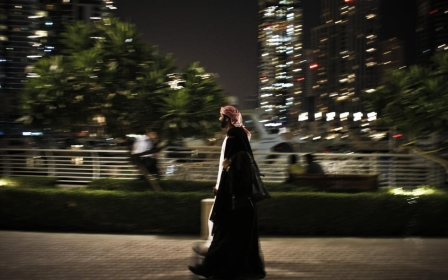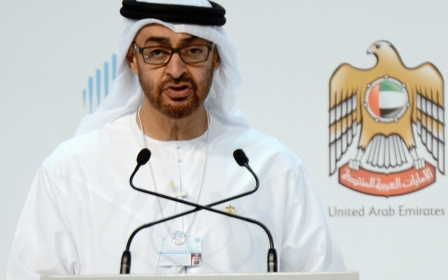Million-dollar numbers in the UAE: Big egos or big business?

In 2008, 25-year-old Emirati businessman Saeed al-Khouri spent an incomprehensible amount on license plates adorned with just a single digit - the number "1" which he brought for $14.2 million.
The record-breaking Abu Dhabi plates, which to this day have not been surpassed as the world’s most expensive licensing exercise, cost 10 times the price of the sportscar they adorn, a Pagani Zonda F Roadster that is itself touted as one of the world’s most expensive cars with a price-tag of around $1.4 million.
Al-Khouri’s purchase may have been anomalous in terms of the money spent, but the trade in so-called distinctive or vanity numbers – for both license plates and mobile phone numbers – is a routine part of life in the UAE. With numerous dedicated auction houses that perpetuate the hysteria year round, the UAE’s official transport and telecommunications bodies also host public auctions several times a year.
It is an exercise in status symbols that reaches the highest echelons of society. The UAE vice-president and ruler of Dubai, Sheikh Mohammed bin Rashid al-Maktoum, also famously operates behind the license plate "1" in Dubai, the counterpart to al-Khouri’s Abu Dhabi plates.
The most expensive phone number in world
Mohamed Hilal may have one of the most expensive phone numbers in the world, after buying the number 052 2222222 for $2.2 million (Dh8.1 million) in April this year from telco giant Du, but he says he didn’t actually intend to buy anything when he turned up to the auction.
“There was no idea. I didn’t want to buy the number, I was just there... you just grab opportunities and see how you can strike with it.”
In fact, the mildly eccentric perfumery entrepreneur, who owns a string of scent and hospitality brands across the region, claims not to even much like the number.
“I don’t like the number ‘2’ in itself…but it is the first number you can have a team with.”
This rationale reflects the patriotism and sense of community that he wears proudly, explaining this as one of the main reasons for his dizzying purchase, alongside boldness, investment and advertising.
Hoping to turn a profit
“I believe that was a valued product of an Emirati company [and] any product this country will produce will have a good return on any investment for a businessman. I don’t spend money just to lose it, I spend money to make it.”
Historically, Du’s competitor Etisalat has had the more expensive numbers. In a matter of seconds, Hilal gave Du the edge, buying the most expensive number in the country.
Hilal says he hasn’t decided what to do with the phone number and isn’t opposed to selling it. But while he has had offers he says, with a hint of contrariness, that he won’t sell the number for anything short of $13.6 million (Dh50 million).
“To me this is unique. To other cultures maybe an old little piece of someone else’s jewelry is worth millions. Who decides this? It’s created demand.”
While Hilal admits he has other such distinctive numbers, he doesn’t want to share the details.
Wealth, materialism and a need for identity
Of course there are as many strokes as there are ultra-rich folks when it comes to outlandish investments by those with telephone-number sized bank accounts. But for the ordinary five-figure income earner to comprehend the astronomical sums being splashed about on abstract numbers, some social context is needed.
Associate Professor of Sociology at Zayed University Dr Rima Sabban explains there are several motivations for these phenomenal purchases – none of which relate to a particular attachment to numbers. Unlike the South Asian expatriates, who comprise a large percentage of the population and also partake in the auctions, local Emiratis and other Arabs hold no real stock in numerology, Sabban says.
Numbers like seven are said, by some, to be important in the Quran, and individuals may also have affinities with numbers for personal reasons like birthdays. But what much of it comes down to, she says, is a combination of excess wealth, materialism and a need for identity.
“Basically in this society nationals feel continuously squeezed by foreigners so they feel they are losing space and place.
“Part of it is showing off their presence - 'here we are, we are different, we can get what others cannot get, we can live differently'. It’s a form of an ego statement.”
While statistics are scarce on the topic, it is generally accepted foreigners comprise between 80 and 90 per cent of the population in the UAE.
“Egos grow out of a sense of insecurity.”
There is a common Arabic verb in this age, the Emirati professor says, of being “sheikh-like”.
Wanting to belong
Many expatriates long to become citizens of the oil-rich country – something that rarely happens and is almost entirely discretionary - to enjoy the famously generous comforts provided by authorities such as free healthcare, free education, access to a wide range of scholarships and government housing.
“What I have seen developing in this society is that it starts with Emiratis but then it gets picked up by others so they want to become like them - they want to be privileged, they want to stand out, they want to be able to show off, particularly among the increasing number of wealthy expatriates.”
Having distinctive plates and phone numbers is a shorthand for “we have money too,” she says.
“The UAE nowadays is one of the places where the largest number of Indian millionaires is growing. They all start picking up these habits that they see in the public.”
Of course, there is a perfectly functional use to the highly sort-after numbers as well, “to be fair to all,” Sabban says.
“Having small numbers makes it easier to remember your number plate and phone number.”
But then a bin with a foot pedal makes life easier too, and most people wouldn’t spend millions for the privilege. But these number-holders aren’t “most people”, Sabban emphasises. One man’s life savings is another man’s chump change.
“Things are relative in this life. People would say ‘What is too much money for someone who’s a billionaire?’ For you it’s too much but for them it doesn’t matter.”
However, she urges the country’s residents to consider another way to distinguish themselves: “Become creative or do something actually distinctive.”
“If you want to distinguish yourself through a number I think you’re defeating the purpose of making yourself."
Despite growing unpopularity, plates pay off
Dubai’s Roads and Transport Authority (RTA) holds four live auctions and seven online auctions for number plates each year.
Ahmed Hashem Bahrozyan, the CEO of the RTA’s Licensing Agency, says the authority has been hosting auctions since 2007, taking over from the Dubai Police.
“The reason behind it is to give the customers the opportunity to own special numbers and increase the transparency,” he says.
The motivations for people are different. “Some of the numbers represent special concepts and some represent a special date for the buyer. For example for a Porsche Carrera, the owner would like to have [the plate] P 911, for a Mercedes G 65 they would like to own [the plate] G 65. Some other numbers represent Air Force models like F 16.”
Bahrozyan says the plates that usually attract the highest prices are ones that have single or double digits, especially if the double digits are the same number.
“Also numbers that include a ‘0’ makes for a good number, like 10, 20 or 30.”
And despite the growing popularity, the stream of revenue generated from the plates, some of which often goes toward charitable causes, is very unlikely to dry up any time soon. The same number can be released under a new “code” – a discreet letter on the plate.
Bahrozyan says the plates are often more than just vanity, and distinctive numbers are actually a business prospect for many.
“For plate number traders, it’s always good for their investment to resell it at a higher price.”
Which puts a new light on things. In a few years’ time, Saeed Al Khouri’s $14-million-dollar plates should start paying dividends.
Stay informed with MEE's newsletters
Sign up to get the latest alerts, insights and analysis, starting with Turkey Unpacked
Middle East Eye delivers independent and unrivalled coverage and analysis of the Middle East, North Africa and beyond. To learn more about republishing this content and the associated fees, please fill out this form. More about MEE can be found here.





